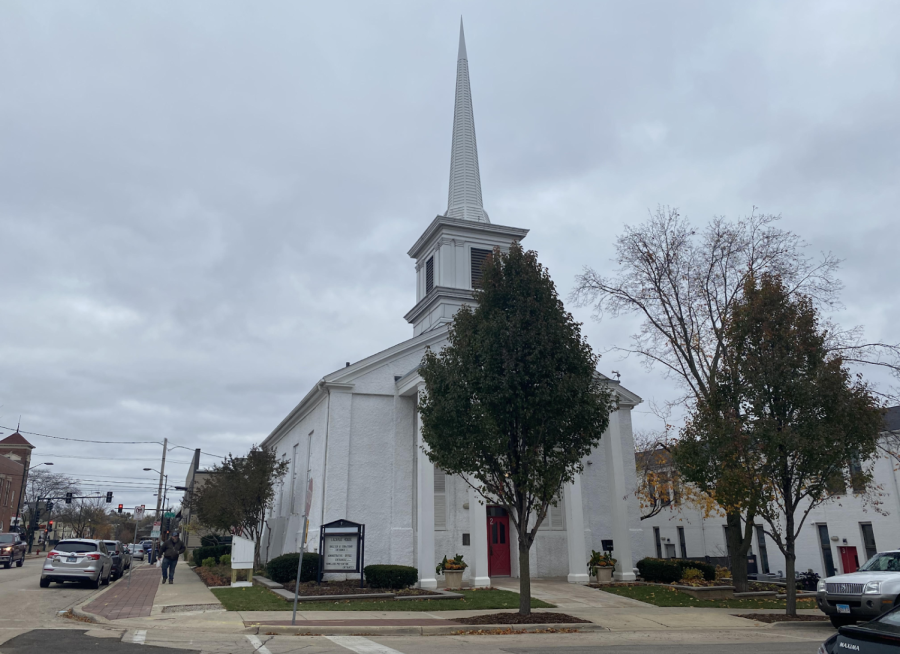Lazarus House: A Home for the Homeless
Photo By Lizzy Sidman
Lazarus House is located at 214 Walnut Street in St. Charles, IL. In a normal year, the shelter houses 78 guests.
As snow is falling quickly and wind wreaks havoc on trees, most people are sitting at home with their loved ones, fire crackling in the background. The less fortunate instead sit outside on the street in their winter coats. The first few days of fall and winter were not too bad for their coats to handle, but now they are shaken to their core and shivering perpetually. The weather outside is frightful, but there is no delightful fire to warm them. At least not until they reach Lazarus House, a homeless shelter like no other.
A St. Charles-based homeless shelter, Lazarus House requires help this winter as the extremities of homelessness are fully realized.
“[Our goal is] to provide a soft place to land for individuals who are experiencing homelessness,” Executive Director of Lazarus House Julie Purcell said.
Lazarus House has an emergency shelter where they take in as many people in need as possible to stay for the night. This service is different from other shelters where someone may have to wait in line and fight for a bed at night.
Instead, Purcell said, “When an individual comes to Lazarus House they are given a bed and a place to store their items, and they have a locker that they have a lock on to store valuables. That really becomes their space.”
These people need a sense of normalcy and security, as homelessness can spread chaos in people’s lives. By providing these simple things like a place to store their belongings, they allow those without a home to feel like they belong somewhere and are treated like human beings, not a sublevel person who is judged for being who they are and their oftentimes uncontrollable situation.
Previously homeless man David Pirtle recalled many homeless shelters as “big warehouses that are just places where we stick people at night, and we really don’t have any regard for how they live there.”
Of the recorded 580,466 homeless Americans in 2020, according to that year’s U.S. Department of Housing and Urban Development (HUD) report, over 70 percent of the individuals are chronically homeless. This means that most homeless people do not find permanent housing that lasts long enough to feel like home. These people turn to shelters, and many of them, like Pirtle, likely can recall some unwelcoming and competitive environments. Lazarus House, though, prides itself on its humanity and ability to get its guests into a job and eventually permanent housing that lasts a lifetime.
“We do a lot of case management,” Purcell said.
Case management refers to the work that Lazarus House does to further assist its guests. This could be substance abuse counseling, tutoring, employment services and many other resources. By going the extra mile, it allows more guests than to be expected for a homeless shelter to get their lives back on track and obtain independent housing.
Their building meant to house 78 people can no longer sustain the needs of everyone there, largely due to complications stemming from the COVID-19 pandemic. Lazarus House has therefore recently been forced to move its guests into hotel rooms. In a place once bustling with energy and people, silence floods the walls of the building.
“Our guests ended up being in hotel rooms for almost eight months,” Purcell said.
COVID continues to affect people throughout the world, but those in and working with the homeless community have been hit especially hard. Before outbreaks could ensue in a filled-to-the-max building, hotel rooms seemed to be the only option. The main problem with this was the expenses piling up. Another huge problem was that there wasn’t as much face-to-face interaction happening between guests and those who service them.
Science and Medicine Editor of the Los Angeles Times Karen Kaplan said, “As of late September, roughly 57% of unhoused people were at least partially vaccinated against COVID-19. That’s well below the countywide rate, which now stands at 69.4% according to the Times Tracker.”
Many homeless shelters, including Lazarus House, are working day and night to protect their tenants from COVID-19, and that all starts with education and encouragement.
Lazarus House does absolutely everything they can to aid their guests, and that is especially true in the case of one woman.
“We had a woman in the shelter with us a couple of times. Her story of homelessness started when she got divorced, and she had nothing when she left that relationship, and she started staying with us. She did get successfully employed, but due to some mental health issues, she lost that position and became homeless once again in our shelter,” Purcell said. “Her case managers made sure that she got the mental health assistance that she needed, and she became employed through our homeless prevention program. She qualified for one of the grants, and her case manager got her housed back in the community. She was even able to regain custody of her daughter.”
Homeless shelters like Lazarus House work because they care about their residents. Lazarus House puts a special emphasis on how the people who don’t have homes are our neighbors. The shelter services Geneva, St. Charles, Batavia and western rural Kane County. These people could have gone to Kaneland High School in the past, or they may even be here currently.
“You never know when someone in your high school could be sleeping in their car with their parents or maybe living with another family, and if they do not know about our shelter they may lose a resource for them,” Purcell said.
Lazarus House calls Kaneland High School students to help them because homelessness isn’t just limited to large cities.
“A lot of people think homelessness is like what it is in the city with lots of people on the streets, and out in our area that’s not what homelessness is. It’s the families, it’s the senior citizens, it’s the young people. Out here, it’s our neighbors,” Purcell said.
Lazarus House does everything they can to help the disadvantaged, and they need the help of anyone who can. On their website is an urgent needs list that is updated weekly telling what the shelter needs most at the time. If donating is not an option, after it is opened back up, kids over 16 can volunteer in the emergency shelter. As winter approaches, Lazarus House needs all the help it can get.

Name: Lizzy Sidman
Position: Production and Ads & Business Executive
Graduation year: 2024
A few sentences about...








